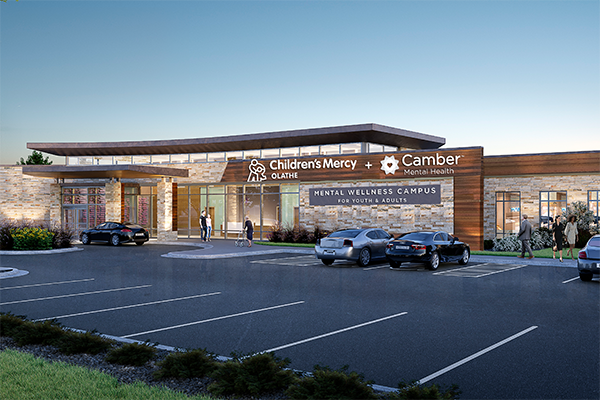- Locations
- How We Help
Overview
As the regional leader in youth mental health treatment, our innovative services help youth achieve health and wellness.
Treatment Programs
- Admissions
Overview
Learn how to admit your child to a Camber treatment location or make a client referral.
- Youth Disorders
- Resources
Overview
Our free resources help you stay informed and educated about mental health, brain development, and childhood trauma as well as how Camber is working toward building healthier communities.
- About Us
Overview
Our philosophy is to provide collaborative, compassionate and effective care through the use of timely, individualized treatment planning.
Learn More About Us
ADHD
 Attention deficit hyperactivity disorder, also known as ADHD, is a neurodevelopmental disorder. This means it is a condition caused by differences in the development and function of the nervous system. ADHD affects people’s behavior and can cause them to be hyperactive and struggle with acting on impulses and concentrating.
Attention deficit hyperactivity disorder, also known as ADHD, is a neurodevelopmental disorder. This means it is a condition caused by differences in the development and function of the nervous system. ADHD affects people’s behavior and can cause them to be hyperactive and struggle with acting on impulses and concentrating.
There is no known cure for ADHD, but it can be managed with appropriate supports and treatment. The level of treatment needed is different for every child. While some children may be able to function relatively well with minimal treatment, others may need intensive care to help manage their symptoms. This may include therapy and/or medication management.
![]()
Types of ADHD
There are three ways that ADHD presents throughout a child’s life:
Predominantly inattentive: A child struggles with concentrating, especially when they are trying to focus on one thing for a prolonged amount of time, such as homework.
Predominantly hyperactive/impulsive: A child struggles with acting on impulses, fidgeting or talking a lot. They may often be impatient or irritated when they want something.
Combined: A child struggles with controlling impulses, hyperactive behaviors, and concentrating and becomes easily distracted. This tends to be the most common type of ADHD that we treat in the children we serve at Camber.
Signs and Symptoms
It can be difficult for a child to understand and explain what they are feeling so it’s very important for caregivers to pay close attention to behaviors.
There are two types of behavioral challenges someone with ADHD may experience—inattentiveness and hyperactivity/ impulsiveness. A child may have challenges that fall into one or both of these categories, including:
Inattentiveness:
- Short attention span, easily distracted
- Appearing forgetful, often losing things
- Making several, simple mistakes or missing details
- Unable to complete tasks that are time-consuming
- Unable to listen well or follow instructions
- Frequently changing to different activities or tasks
- Difficulty organizing tasks or thoughts
Hyperactivity and impulsiveness:
- Unable to sit still, especially in calm or quiet settings
- Constantly fidgeting or making excessive physical movements
- Talking a lot
- Impatient, such as unable to wait their turn
- Impulsive, often acting without thinking
- Interrupting conversations, finishing other people’s sentences
- Doesn’t seem to sense or fear danger
What You Can Do to Help
If you know a child who is struggling with ADHD, here are some ways you can support them:
- Keep a consistent routine with them every day, from wake-up time to bedtime. Keep the schedule somewhere that they can always see it, such as on the refrigerator or a bulletin board in the family room. If there needs to be changes to the schedule, let them know as far in advance as possible. A predictable schedule is extremely helpful for all children, especially those with ADHD.
- Keep everyday items well organized so that each item has a specific place where they can always find it. This may include having a designated shelf for their backpack, cleaning favorite clothing items often and always organizing clothes in the same drawers.
- Use organizers for school materials, homework and supplies. Help them understand the importance of writing down assignments and bringing home the necessary books.
- Remain clear and consistent when giving directions, rules or other guidance. Consistency is key to helping children with ADHD manage their symptoms.
- Give praise or rewards when rules or directions are well followed. Children with ADHD often receive and expect criticism. Look for good behavior to recognize and praise.
- Join a training for parents/caregivers to learn skills for managing difficult behaviors in children.
- Work closely with the child’s teachers and school guidance counselors to ensure everyone knows how to best support the child.

Camber Children’s Mental Health Can Help
Camber is a network of nonprofit children’s mental health hospitals and residential treatment centers serving youth ages 6 to 18. Each year, we give thousands of youth a safe place to heal, build resilience, and overcome struggles with mental health conditions. Our compassionate team of psychiatric, medical and behavioral health professionals provides a nurturing and therapeutic experience along with a treatment plan tailored to meet each child’s individual needs. The goal of our treatment programs is for each child to safely return home with the resources and supports in place to live a healthy and happy life in their community.
If you’re concerned that a child in your care is struggling with ADHD or other mental health needs, call Camber at 913-890-7468. We’re available 24/7 to answer your questions.
Here are some Camber resources to help you understand and cope with ADHD:
- Watch a recorded webinar about ADHD diagnosis, care and treatment [VIDEO]
- Download a free guide about the 5 things every child needs for good mental health
- Learn how to build resilience and cope with stress in healthy ways [VIDEO]
- Use our pro tips to help kids deal with school stress
- Get some energy out and follow along with these simple exercises [VIDEO]
- Learn how psychiatric medication and therapy can be combined to treat ADHD
- Help youth adjust to new routines and structures [VIDEO]
- Build strong brain “muscles” and improve thinking skills with these fun and easy games
Here’s a list of additional resources you can contact for help:
- Access free resources and education from the Children and Adults with Attention-Deficit/Hyperactivity Disorder (CHADD) organization at chadd.org
- Call the child’s primary care physician or your local community mental health center
- Text HOME to 741741 for 24/7 support from the Crisis Text Line
- Call the National Alliance on Mental Illness helpline at 800-950-6264 or visit their website at nami.org
- Learn more about ADHD from the Child Mind Institute
Share this information with your support system! View and download this information as a PDF.




